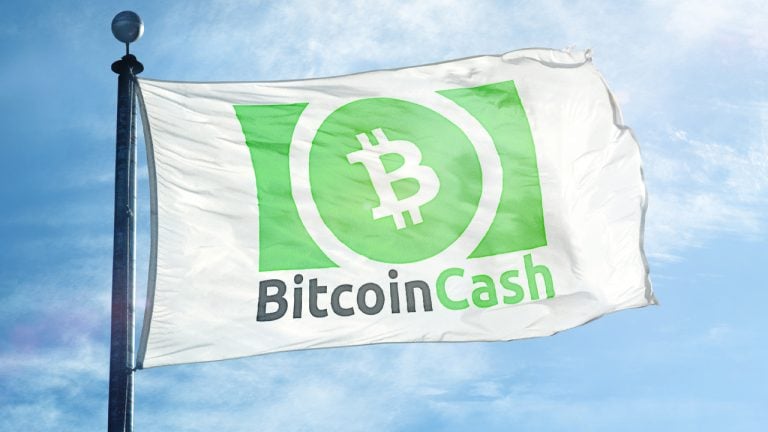 The Bitcoin Cash network has completed its latest upgrade which essentially implemented the highly anticipated adaptive blocksize limit (ABL) algorithm. The new feature will make it much easier to change the block size limit in order to meet the demand of the network’s throughput. As of 9:24 a.m. Eastern Time on Wednesday, five blocks have […]
The Bitcoin Cash network has completed its latest upgrade which essentially implemented the highly anticipated adaptive blocksize limit (ABL) algorithm. The new feature will make it much easier to change the block size limit in order to meet the demand of the network’s throughput. As of 9:24 a.m. Eastern Time on Wednesday, five blocks have […]
The proposal for MATIC’s technical upgrade is subject to approval from the Polygon community. Once approved, MATIC’s upgrade to a multipurpose token will result in its renaming to POL.
Ethereum layer 2 development firm Polygon proposed upgrading its in-house MATIC (MATIC) token into a multipurpose token that can be used to validate multiple chains.
The proposal for MATIC’s technical upgrade is subject to approval from the Polygon community. Once approved, MATIC’s upgrade to a multipurpose token will result in its renaming to POL.
According to the announcement shared with Cointelegraph, POL’s utility will span all the Polygon protocols, which includes Polygon PoS, zkEVM and Supernets. Sharing details about the anticipated upgrade, the announcement read:
“Primarily, it enables the pool of protocol participants, i.e. actors to scale to support thousands of Polygon chains without sacrificing security.”
The utility of POL revolves around validators, with the goal of aligning and incentivizing them to perform useful work. If the upgrade proposal goes through, the redesigned protocol architecture will introduce features such as infinite scalability and no friction between any two protocols.

For validators, POL staking can open up three incentive streams — protocol rewards, transaction fees and additional rewards. In addition to validating multiple chains, validators can also perform multiple roles on a single chain, which includes zero-knowledge proof generation and participation in DACs (Data Availability Committees).
Related: Polygon proposes architecture for ‘Polygon 2.0,' including aggregator bridge
In May, Polygon co-founder Sandeep Nailwal said that Web3 gaming will eventually become one of the biggest drivers of mass crypto adoption.

When asked about his take on the “real life” use cases for blockchain other than trading and payments during an AMA, he sided with the gaming ecosystem:
“There are some top games launching in Web3 in the next 6-18 months and it would be very interesting to see if some of them are able to crack the crypto code. Last year itself there was $2 billion+ in funding for Web3 games.”
On an end note, Nailwal highlighted the need for a “progressive decentralization of protocols and applications as they achieve larger and larger significance.”
Collect this article as an NFT to preserve this moment in history and show your support for independent journalism in the crypto space.

Cryptocurrency exchange Binance continues upgrading its wallet infrastructure, which requires affected users to get new wallet addresses.
Binance cryptocurrency exchange is preparing for another upgrade of its wallet infrastructure, warning users about the upcoming address migration.
On July 6, Binance officially announced that it will be retiring selected deposit addresses in batches as part of a network address migration scheduled for Q3 2023.
Binance’s latest wallet upgrade will affect a total of 40 cryptocurrencies, including Bitcoin (BTC), Bitcoin Cash (BCH), XRP (XRP), Solana (SOL), Monero (XMR), Litecoin (LTC), Dogecoin (DOGE), Cardano (ADA), Polkadot (DOT) and others.
In addition to wallet addresses, Binance will be also deactivating memos. Also known as a destination tag, a wallet memo is an additional address feature necessary to identify a transaction recipient beyond a wallet address. As most centralized exchanges like Binance use one wallet address for all traders, the tag or memo is used to determine the individual account.
According to the announcement, Binance will send notifications to impacted users. The firm strongly encouraged all impacted account holders to get a new address and memo upon receiving the notification.
Binance emphasized that users should continue their current deposit addresses if they have not received an official notification from Binance, stating:
“Only impacted users who receive notifications from Binance are required to obtain a new deposit address and memo — if applicable — before the expiry date. [...] Old deposit addresses will expire upon obtaining a new address.”
At the same time, funds deposited into an expired address will not be lost, the announcement notes. But unlike regular deposits, the deposits made into expired addresses would not be automatically credited, requiring users to manually credit them via the transaction history page.
Related: Poly Network urges users to withdraw after exploit affects 57 crypto assets
Binance’s wallet upgrades aren’t something new. Binance regularly upgrades its wallet infrastructure in order to provide “better efficiency and fund security for users.”
The exchange previously proceeded with such an upgrade in April 2023, disabling old deposit addresses for networks like Ether (ETH), a number of EVM-compatible coins, Binance Coin (BNB) and others.
Binance didn’t immediately respond to Cointelegraph’s request to comment. This article will be updated pending new information.
Magazine: Should you ‘orange pill’ children? The case for Bitcoin kids books

Mihailo Bjelic suggested that adding zero-knowledge proof technology could bolster the network’s security while still keeping fees low.
Polygon co-founder Mihailo Bjelic has proposed upgrading the Polygon Proof of Stake (PoS) network to a “zkEVM validium” version, according to a June 20 forum post. If the upgrade is implemented, the new version will rely on zero-knowledge proofs to increase security.
HUGE UPDATE ON #Polygon
— Hitesh Malviya (@hmalviya9) June 20, 2023
Polygon may go through some huge changes in near future. @MihailoBjelic shared a polygon improvement proposal few hours ago which discussed to upgrade polygon POS to zkEVM Validium.
According to the proposal, Polygon POS is facing three key challenges…
Polygon PoS is an Ethereum scaling solution that has over $900 million total value locked within its contracts and does over 2 million transactions per day. It was first launched in 2019. In March, the Polygon team launched a second network, Polygon zkEVM, that uses zero-knowledge proof rollups to scale Ethereum.
In the June 20 post, Bjelic proposed to also upgrade the old PoS network to a zkEVM version, making both networks rely on zero-knowledge proofs. However, unlike the network that just launched in March, the new version of Polygon PoS will not be a “rollup,” Bjelic stated. In other words, it will not store compressed transaction data on Ethereum. Instead, it will be a “validium” that stores only validation proofs on layer 1, while the actual transaction data will be kept on a separate chain.
This compromise will allow Polygon PoS to have lower transaction fees than Polygon zkEVM. It will also increase the security of Polygon PoS, since it will allow the network to inherit Ethereum’s security, the co-founder concluded.
Related: Why ZK-rollups need data availability
Once the upgrade is implemented, Polygon zkEVM may be used for high-value transactions where security is of the utmost importance, whereas Polygon PoS may become the network for gaming and social media enthusiasts, Bjelic suggested, stating:
“Upgraded Polygon PoS (zkEVM validium) would offer very high scalability and very low fees, with the tradeoff of storing transaction data locally instead of on Ethereum. It would be a great fit for applications that have high transaction volume and require low transaction fees, e.g. Web3 gaming and social.”
The Polygon co-founder offered a timeline for when he thought the upgrade could be implemented, stating that his informal proposal could be turned into a formal Polygon Improvement Proposal (PIP) by November and implemented on mainnet sometime between February and March, 2024.
The launch of Polygon zkEVM and upgrading of Polygon PoS is part of a grand plan by the team to create a “Supernet” uniting many different application-specific chains. The devs call this project “Polygon 2.0.”
The native coin of the Polygon ecosystem, called “MATIC,” was delisted by eToro on June 13 after the United States Securities and Exchange commission claimed that it had been sold as an unregistered security. The Polygon team has denied that their fundraise violated any U.S. laws.

According to Polygon Labs, Polygon 2.0 will enable users to create, exchange, and program value on the internet.
On June 12, Polygon Labs announced “Polygon 2.0,” a set of upgrades that seeks to establish the "Value Layer" of the internet, which the company says will allow users “to create, exchange, and program value.”
1/ Our vision for Polygon is simple: to build the Value Layer of the Internet.
— Polygon (Labs) (@0xPolygonLabs) June 12, 2023
The Internet allows anyone to create and exchange information. The Value Layer allows anyone to create, exchange, and program value.
Enter Polygon 2.0: a blueprint to build the ultimate Value Layer. pic.twitter.com/9eYSr3H1L5
According to an announcement shared on Twitter, “Polygon 2.0 is a set of upgrades that radically reimagine almost every aspect of Polygon, from protocol architecture to tokenomics to governance. It is a roadmap for how Polygon will become the Value Layer, offering unlimited scalability and unified liquidity via ZK tech.”
Polygon 2.0 is set out to be a network of interconnected chains powered by Zero-Knowledge (ZK) technology, a cryptographic technique that allows one party, called the prover, to prove the validity of a statement to another party, known as the verifier, without revealing any additional information beyond the statement's validity. According to Polygon Labs;
"The network can support a practically unlimited number of chains and cross-chain interactions can happen safely and instantly, without additional security or trust assumptions. Unlimited scalability and unified liquidity."
At its core, Polygon 2.0 will unify protocols providing “seamless usage across zkEVM, PoS, & Supernets,” making it "feel like you are using a single chain,” Polygon Labs president Ryan Wyatt shared on Twitter. Additionally, he mentioned “Token evolution” and “long-term decentralized governance” as some of the highlights of the technology.
What is Polygon 2.0?
— Ryan Wyatt (@Fwiz) June 12, 2023
At its core:
- Unifying the protocols: seamless usage across zkEVM, PoS, & Supernets; it will feel like you are using a single chain
- Token evolution
- Establish long-term decentralized governance.
It will be a series of announcements this summer. https://t.co/DRWl3kBAkT pic.twitter.com/wUOWP4xHWC
Polygon is expected to reveal more details on the technology in the coming weeks.
Related: Google Cloud to optimize Polygon zkEVM scaling performance
On June 7, Wyatt testified before the United States House Committee on the topic of internet democratization and the potential of Web3 and blockchain technology. The committee's Subcommittee on Innovation, Data and Commerce explored the future of these technologies and the regulatory challenges they present.
During the hearing, Wyatt emphasized the role of blockchain in addressing the "value extraction" problem prevalent in the current internet landscape. He explained that Web3, enabled by decentralized and transparent systems, offers a solution by democratizing the internet and giving users control over their data. Wyatt highlighted the importance of building a well-regulated blockchain ecosystem in the United States, emphasizing the potential benefits for users and the overall economy. The hearing took place shortly after the Securities and Exchange Commission filed lawsuits against major crypto exchanges, adding further relevance to the discussions on regulation and industry development.
Magazine: ‘Moral responsibility’: Can blockchain really improve trust in AI?

Ethereum core developers released patches for Prysm Labs and Teku clients in response to a Beacon Chain issue preventing block finalization.
Ethereum core developers rolled out patches for Prysm Labs and Teku clients as a response to two Beacon Chain finality issues within a 24-hour period. The Beacon Chain serves as the consensus layer for the Ethereum network.
On May 11, Ethereum developers reported that the Beacon Chain was experiencing problems confirming transactions. Although new blocks were able to be proposed, an unknown issue prevented their finalization. The outage lasted around 25 minutes. A similar issue took place on May 12, preventing block finalization for over an hour.
Finality was unable to be reached for 3 and 8 epochs, said the Ethereum Foundation in a statement shared by an Ethereum consultant on Twitter. The issue "appears to have been caused by high load on some of the Consensus Layers clients, which in turn was caused by an exceptional scenario."
The beacon chain stopped finalizing about thirty minutes ago. I don't know why yet, but in general the chain is designed to be resilient against this, transactions will continue as usual and finalization will kick in when the problem is resolved. pic.twitter.com/utAS0uAWpG
— superphiz.eth ️ (@superphiz) May 11, 2023
Although the network was unable to finalize, live and end users were able to transact on the network thanks to client diversity "as not all client implementations were affected by this exceptional scenario."
Client diversity relates to the number of software clients available to network validators. Greater diversity among clients means a more robust and secure network.
Both Teky and Prysm have released upgrades that implement optimizations to prevent beacon nodes from consuming excessive resources.
A similar issue took place on March 15, resulting in a delay in the Goerli testnet version of Ethereum's "Shapella" upgrade, which was successfully deployed on April 12. Ethereum's pre-existing proof-of-work chain merged with the Beacon Chain on Sept. 15, 2022, enabling the network's transition to proof-of-stake consensus mechanism, which is faster and less energy-intensive.
Memecoin's recent trading hype has increased Ethereum's activity and staking rewards rates. According to on-chain data, Validators earned $46 million in the first week of May, or 24,997 Ether, a 40% increase over the previous week’s income of $33 million, when 18,339 ETH were distributed as rewards.
Magazine: Here’s how Ethereum’s ZK-rollups can become interoperable
 Ethereum had issues processing transactions on May 11, 2023, at around 4:13 p.m. Eastern Time on Thursday, and transaction finality issues lasted for roughly 25 minutes. Currently, developers do not know what caused the issue and the blockchain is now running normally. Ethereum Network Experiences Temporary Transaction Processing Issue The Ethereum blockchain was unable to […]
Ethereum had issues processing transactions on May 11, 2023, at around 4:13 p.m. Eastern Time on Thursday, and transaction finality issues lasted for roughly 25 minutes. Currently, developers do not know what caused the issue and the blockchain is now running normally. Ethereum Network Experiences Temporary Transaction Processing Issue The Ethereum blockchain was unable to […] As the Bitcoin Cash enthusiasts brace themselves for the much-awaited upgrade that vows to unleash decentralized applications, General Protocols revealed a complete production release of its decentralized hedging application, boasting a doubled contract size. Meanwhile, those utilizing the privacy-boosting protocol Cashfusion have fused over 17.4 million bitcoin cash since its inception, equivalent to a staggering […]
As the Bitcoin Cash enthusiasts brace themselves for the much-awaited upgrade that vows to unleash decentralized applications, General Protocols revealed a complete production release of its decentralized hedging application, boasting a doubled contract size. Meanwhile, those utilizing the privacy-boosting protocol Cashfusion have fused over 17.4 million bitcoin cash since its inception, equivalent to a staggering […] The Ethereum blockchain is set to undergo its next major update since the network switched from proof-of-work to proof-of-stake through The Merge. The upcoming upgrade, dubbed “Shapella,” which combines the Shanghai and Capella validator changes, is expected to take place on April 12, 2023. While most users will not be affected by the change, the […]
The Ethereum blockchain is set to undergo its next major update since the network switched from proof-of-work to proof-of-stake through The Merge. The upcoming upgrade, dubbed “Shapella,” which combines the Shanghai and Capella validator changes, is expected to take place on April 12, 2023. While most users will not be affected by the change, the […]
A public burn() function introduced in the latest upgrade allegedly allows users to burn tokens from other addresses.
SafeMoon, a project previously endorsed by A-list celebrities and social influencers such as Jake Paul and Soulja Boy, announced its liquidity pool (LP) was compromised. Without revealing further details about the attack, SafeMoon confirmed undertaking steps “to resolve the issue as soon as possible.”
Just like many other crypto projects in 2021, SafeMoon was backed by numerous celebrities. However, a lawsuit from Feb. 2022 alleged that musicians such as Nick Carter, Soulja Boy, Lil Yachty and YouTubers Jake Paul and Ben Phillips mimicked real-life Ponzi schemes by misleading investors to purchase SafeMoon (SFM) tokens under the pretext of unrealistic profits.

Investigating the SafeMoon hack shows that the attacker made away with approximately 27,000 BNB (BNB), worth $8.9 million. SafeMoon has not yet responded to Cointelegraph’s request for comment. Moreover, users have been barred from posting comments on the announcement that revealed the LP compromise.
To the @SAFEMOON community: We want to inform you that our LP has been compromised.
— SafeMoon (@safemoon) March 28, 2023
We are taking swift action in an attempt to resolve the issue as soon as possible. Follow here for updates.
Thank you for your support as we work to address this situation.
Blockchain investigator Peckshield narrowed the problem to a recent software upgrade as a potential culprit that introduced the bug. A public burn() function introduced in the latest upgrade allegedly allows users to burn tokens from other addresses.
As explained by community member DeFi Mark, the attacker used the vulnerability to remove SFM tokens, causing an artificial spike in the token’s price. The attacker took advantage of the situation and sold off the tokens at an inflated price.

The attacker, on the other hand, left a note along with the transaction, as shown above, stating:
“Hey relax, we are accidently frontrun an attack against you, we would like to return the fund, setup secure communication channel , lets talk.”
Until SafeMoon officially announces a resolution, investors are advised against investing in the project to avoid possible loss of funds.
Related: New crypto litigation tracker highlights 300 cases from SafeMoon to Pepe the Frog
Following a recent security incident related to illicit access to hot wallets, Bitcoin (BTC) ATM manufacturer General Bytes plans to reimburse customers that lost funds.
On March 17-18th, 2023, GENERAL BYTES experienced a security incident.
— GENERAL BYTES (@generalbytes) March 18, 2023
We released a statement urging customers to take immediate action to protect their personal information.
We urge all our customers to take immediate action to protect their funds and https://t.co/fajc61lcwR…
As Cointelegraph reported, the hack caused a loss of 56 BTC and 21.82 Ether (ETH), cumulatively worth nearly $1.9 million.
Magazine: Huawei NFTs, Toyota’s hackathon, North Korea vs. Blockchain: Asia Express